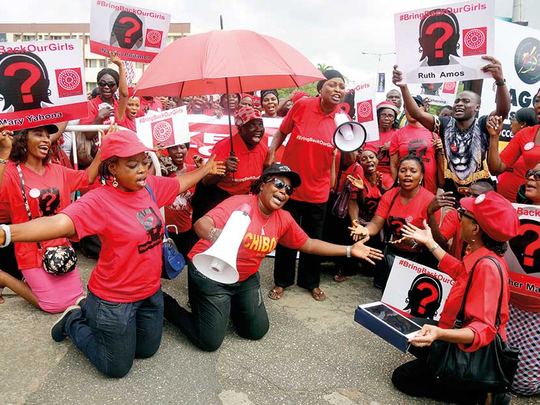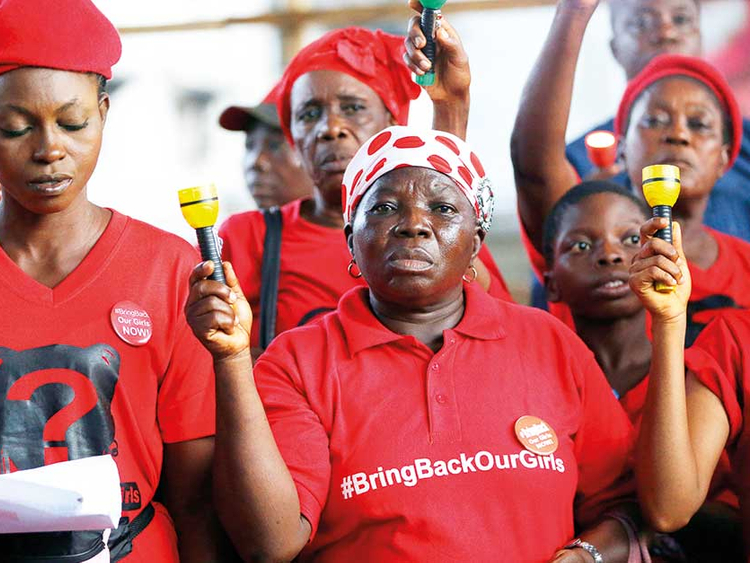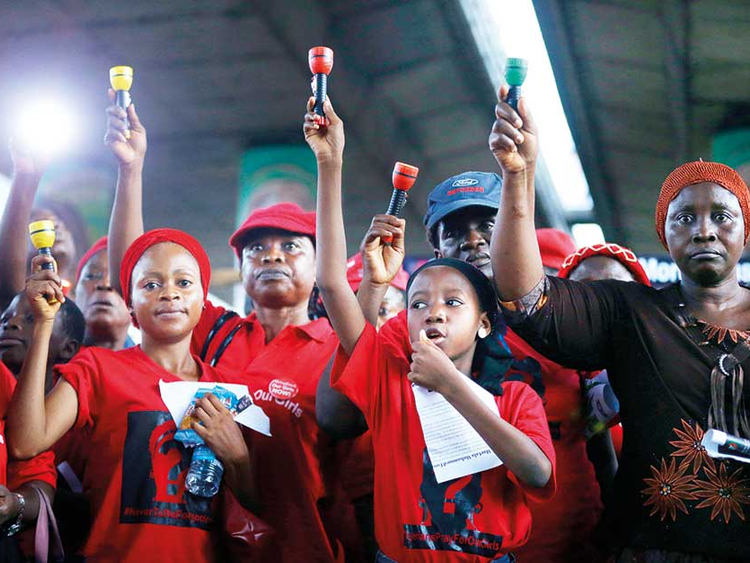
MAIDUGURI, Nigeria: For three gruelling years Pogu and Yana Galang have waited, desperate for their daughters to return home.
The three girls were among nearly 300 female students kidnapped on April 15, 2014, when members of Boko Haram stormed their boarding school in the village of Chibok in northeastern Nigeria during the week of final exams.
The Galangs have parsed numerous rumours and government statements about the captive girls’ well-being. They spotted one daughter, Saratu Ayuba, in images of the hostages that have trickled out from the militants’ hideouts.
When one of the girls from Chibok was found roaming in the forest last year, and a few weeks later, in October, when a group of 21 girls was released, the Galangs listened intently for fresh word of their own daughters’ fate. The girls freed in October told the anxious parents that when they had left their camp, the Galangs’ three daughters were healthy.
That was the last news they have had. They try to console themselves with the fact that they have seen no photographs indicating their daughters are dead.
“The government keeps promising us that our daughters would be rescued,” Yana Galang said. “It’s taking longer than we expected, so the pain persists.”
On Thursday, Nigerian government officials said they were negotiating the release of more of the nearly 200 girls who remain captive. But the government is known for exaggerating its successes against Boko Haram. Officials made the same statement months ago, so the new one generated little optimism among family members.
The kidnappings of the girls from Chibok created a firestorm on social media, a single act in a rural village that trained the world’s focus on a militant group that was already known for taking and killing young girls and boys as it rampaged through northeastern Nigeria. Social media and the #BringBackOurGirls hashtag rallied even celebrities to call for the girls’ release.
It did nothing to change Boko Haram’s murderous ways. Since that day three years ago, the group has burnt villages, killed residents and taken the fight to three other nearby nations, forcing nearly 3 million people in the region from their homes. The marauding continues, but the group has faced setbacks as the Nigerian military makes major progress rooting fighters from their forest hideouts.
In the process, soldiers searching for Boko Haram militants have killed unarmed civilians in massacres described by survivors. The military has swept up innocent adults, children and babies, detaining them for weeks or months in screening centres. This week, 371 women, children and older people were released from an army barracks in Maiduguri after being suspected of ties to Boko Haram, according to Unicef. The group said 1,500 children were held by the military last year.
In the years after the Chibok girls’ kidnappings, Boko Haram’s tactics have grown even more horrific. Kidnapped children have been forced into fighting for the group, taking up weapons and abducting other children. The group regularly straps bombs to young women and sends them into crowds, and has forced children as young as 7 and a pregnant woman carrying a baby on her back to don suicide vests and carry out attacks.
Since 2014, 117 children have been used by Boko Haram to bomb public places across Nigeria, Chad, Niger and Cameroon, according to a Unicef report issued on Wednesday. The report said 27 children had been used in suicide attacks in the first three months of 2017 compared with nine during the same period last year.
“As a consequence, girls, boys and even infants have been viewed with increasing fear at markets and checkpoints, where they are thought to carry explosives,” said a Unicef news release about the report.
Many Nigerians fear the girls from Chibok might be used as suicide bombers, but no evidence of this exists. Some former captives have said the girls were separated from other captives and received special treatment like more food. Officials said some of the freed girls told them that a handful of their captive classmates died during childbirth or in military raids on Boko Haram camps.
The group Bring Back Our Girls has planned lectures and protests this week to draw attention to the fact that three years have passed without the government’s fulfilling its promise to rescue all the girls from Chibok. With that other people in Nigeria also suffering, the group is calling for a national registry of missing persons that would include those affected by the Boko Haram war and beyond.
Rotimi Olawale, a group spokesman, said advocates feared that if the remaining Chibok students were not rescued soon, officials might be distracted by the nation’s other crises, including an economic recession, and by elections next year.
“We know Nigeria has several challenges, and we continue to put pressure on the government,” Olawale said. “We continue to advocate that this becomes a priority for the government, and it doesn’t go to the back burner.”
Those students who have been freed by the military remain in government custody. Some have told their parents they are going to school in or near Abuja, the nation’s capital, but officials have said very little about them.
Kashim Shettima, the governor of Borno state, where Chibok is, said he and his wife had visited the girls and they “are absolutely in the best frame of mind to return to school.”
“The focus of the world is on the Chibok girls but there are good reasons,” he said. “The whole world is concerned as a matter of resistance to the Boko Haram ideology.”
Parents have seen daughters who were rescued only briefly, not long after they gained their freedom. A group of girls was taken to Chibok late last year to visit their families, but the occasion was fraught. The girls were barred from going to their family homes and the amount of time with their parents was strictly limited, restrictions officially attributed to security concerns and poor communication with relatives.
Kyallu Ibrahim is one of the lucky relatives from Chibok. Her granddaughter, Raphael Ibrahim, was among the 21 girls rescued last October. She said she spoke with her every week or so by telephone.
“I thank God she was found alive and healthy,” said Ibrahim.














